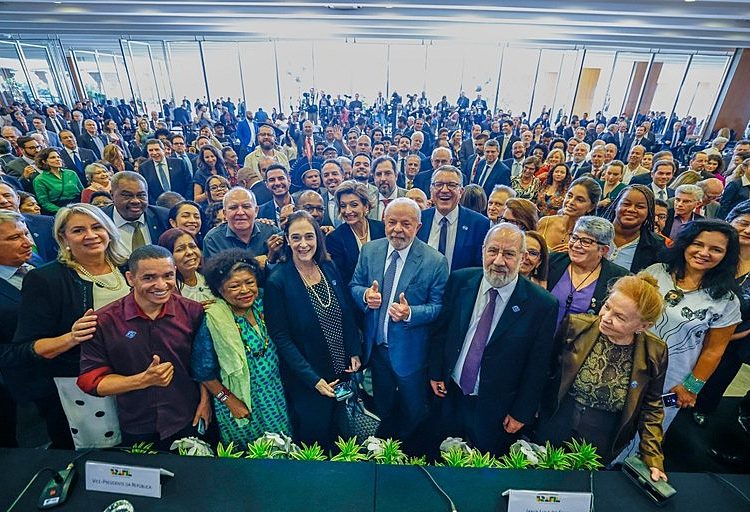The refounding of the Council for Sustainable Social Economic Development (CDESS), also known as the "Big Council", symbolizes a process of resumption of social participation in government decisions that can be considered historic for Brazil.
Members of the new Big Council, as the group is known, reaffirm to Brasil de Fato that the country is once again considering Brazilian diversity in the political debate and ensuring that society is listened to in the elaboration of public policies.
Nalu Faria, from the World March of Women and member of the CDESS, says that the inclusion of sustainability in the agenda of the collective is a sign that the government seeks a broad reconstruction of democracy. According to her, the willingness of public authorities is an important starting point for dialogue.
“It is important that a space like this, even if it is so heterogeneous, allows for dialogue and has a starting point for this dialogue, which is a government that is proposing to change Brazil. We've debated this so much during the pandemic, how the economic and social dimensions are inseparable. In this sense, a space for dialogue like this is important to clarify the debates and seek to build common visions, as well as to deal with tensions."
:: Without Bolsonaro, Brazil climbs 18 positions in world press freedom ranking ::
Ayala Ferreira, from the national coordination of the Landless Workers’ Movement (MST) and also councilor, says that the recreation of the Big Council represents a unique moment for the national development project. According to her, the movement expects the space to represent dialogue with diversity without giving up structural principles.
"Today's act was the strong resumption of the Big Council, representing sectors of the business community, rural social movements, such as the MST, union movement, research institutions and a range of subjects that represent this diversity that composes the sectors of Brazilian society. The council's great effort is to think about economic development, taking care of these social dimensions and facing profound inequalities, having the environmental agenda as supporting bases and pillars.”
Twenty years ago, when the first version of the forum was created during the first government of Luiz Inácio Lula da Silva (Workers' Party), Brazil had never had the experience of placing civil society so close to the actions of public power. At the time, some economic challenges such as hyperinflation had already been overcome, but inequality was still significant.
According to the Brazilian Institute of Geography and Statistics (IBGE), data from 2000 to 2003 indicate that 32.6% of Brazilian municipalities had more than half of the population living in poverty. The country was the eighth most unequal nation on the planet.
:: Brazilian Federal Police searches Bolsonaro's house and arrests Colonel Mauro Cid
In this scenario, social participation was essential for a development agenda. It represented one of the elements of the equation that took Brazil off the hunger map and reduced extreme poverty by 75% by 2014, according to data from the United Nations (UN).
In a way, the reality that welcomes the new Big Council resembles that of twenty years ago. After the dismantling and defunding promoted since the coup against Dilma Rousseff (Workers' Party) and strengthened in the government of Jair Bolsonaro (Liberal Party), more than 33 million people started to live in hunger and almost 30% of the population have less than US$ 100 household income per capita, as shown by a study by Fundação Getúlio Vargas.
Raimundo Bonfim, general coordinator of the Popular Movements Central and member of the CDESS, says that the role of civil society in the reconstruction of the country is even more important after four years of conservative administration in which spaces for consultation with the population were extinguished.
“Especially after an authoritarian government, which put the country on the hunger map, it is very important to return to this space of dialogue, of debate with society. There are representatives who have different views of politics, economics, social and environmental issues. But it is in this divergent debate that we can build a pact in the sense of elaborating and formulating public policies for economic development, for the creation of jobs, for combating hunger, for social inclusion.”
:: On May 1st, Lula defends that minimum wage increasing makes the 'wheel of economics' turn ::
Sérgio Nobre, president of the Unified Workers’ Central and also a member of the Council agrees that the strengthening of democracy is only possible with popular participation.
“There is no democratic government without popular participation, without social participation and the Big Council represents exactly that: the influence of organized society in the decisions of the federal government. It is another commitment made by President Lula to the Brazilian people during the 2022 campaign, which has become a reality”.
The Big Council has more than 240 members, including representatives of popular movements, the business community, organizations defending human rights and the environment, as well as the financial market. It is chaired by Lula, and also has vice-president Geraldo Alckmin (Brazilian Socialist Party) and minister Alexandre Padilha (Institutional Relations) as government representatives.




